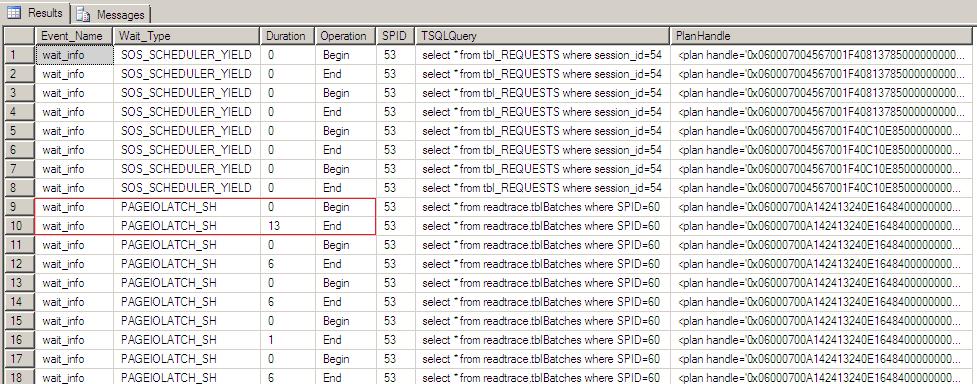Troubleshooting slow running query using Extended Events Wait info event
Extended Events introduced in SQL Server 2008 is a detailed event infrastructure for SQL Server. If your environment is running with more SQL Server's of version > 2008, it is the right time to learn about Extended events since they help you a lot in troubleshooting SQL Server performance issues.
In general there are two things possible in SQL Server: Running or Waiting. Most often the percentage of wait will be more than percentage of running in a given Environment. So you should start with minimizing the waits percentage and once that comes below the running percentage, start focussing on minimizing the running percentage by tuning the query (query hints, plan guide etc..). So, I'm more interested in the troubleshooting methodology of using Waits info in case of SQL Server peformance issues because you fix the main culprit first. This whitepaper talks about the methodolody of troubleshooting performance issues based on Waits and Queues. (Note: Sometimes you might have to troubleshoot both waits and running percentage parallely depening on the situation)
While we troubleshoot a performance issue based on waits, there is a limitation that all existing DMV's, DMF's provide server lever waits. So if you need to troubleshoot waits encountered by one particular session or a query... What is the option??. The option is using the Extended Events available in SQL Server 2008 and higher version.
Here is the XEvents query to track the waits information for a query being executed from particular session. I'm also attaching the t-sql script, if the browser is not rendering this page correctly.
This code is provided AS-IS with no implied warranty
-- *** Change the Session ID values as per your need ***
-- Check for existing session
IF EXISTS(SELECT * FROM sys.server_event_sessions WHERE name='Waits_of_Particular_Session')
DROP EVENT session Waits_of_Particular_Session ON SERVER;
GO
-- Create a session and add events and actions
CREATE EVENT SESSION Waits_of_Particular_Session
ON SERVER
ADD EVENT sqlserver.sql_statement_starting
(
ACTION (sqlserver.session_id,
sqlserver.sql_text,
sqlserver.plan_handle)
WHERE
sqlserver.session_id > 52 AND sqlserver.session_id < 54
),
ADD EVENT sqlos.wait_info
(
ACTION (sqlserver.session_id,
sqlserver.sql_text,
sqlserver.plan_handle)
WHERE
sqlserver.session_id > 52 AND sqlserver.session_id < 54
),
ADD EVENT sqlos.wait_info_external
(
ACTION (sqlserver.session_id,
sqlserver.sql_text,
sqlserver.plan_handle)
WHERE
sqlserver.session_id > 52 AND sqlserver.session_id < 54
),
ADD EVENT sqlserver.sql_statement_completed
(
ACTION (sqlserver.session_id,
sqlserver.sql_text,
sqlserver.plan_handle)
WHERE
sqlserver.session_id > 52 AND sqlserver.session_id < 54
)
ADD TARGET package0.asynchronous_file_target
(SET filename=N'C:\Temp\Waits_of_Particular_Session.xel')
WITH (MAX_DISPATCH_LATENCY = 5 SECONDS, EVENT_RETENTION_MODE=ALLOW_SINGLE_EVENT_LOSS, TRACK_CAUSALITY=ON)
GO
-- Start the Session
ALTER EVENT SESSION Waits_of_Particular_Session ON SERVER
STATE = START
GO
-- Run the query from the SPID
-- Code to stop the session once the query execution completes
ALTER EVENT SESSION Waits_of_Particular_Session ON SERVER
STATE = STOP
GO
-- Parse the XML to show wait details
SELECT
event_xml.value('(./@name)', 'varchar(1000)') as Event_Name,
event_xml.value('(./data[@name="wait_type"]/text)[1]', 'nvarchar(max)') as Wait_Type,
event_xml.value('(./data[@name="duration"]/value)[1]', 'int') as Duration,
event_xml.value('(./data[@name="opcode"]/text)[1]', 'varchar(100)') as Operation,
event_xml.value('(./action[@name="session_id"]/value)[1]', 'int') as SPID,
event_xml.value('(./action[@name="sql_text"]/value)[1]', 'nvarchar(max)') as TSQLQuery,
event_xml.value('(./action[@name="plan_handle"]/value)[1]', 'nvarchar(max)') as PlanHandle
FROM
(SELECT CAST(event_data AS XML) xml_event_data FROM sys.fn_xe_file_target_read_file('C:\Temp\Waits_of_Particular_Session*.xel', 'C:\Temp\Waits_of_Particular_Session*.xem', NULL, NULL)) AS event_table
CROSS APPLY xml_event_data.nodes('//event') n (event_xml)
WHERE
event_xml.value('(./@name)', 'varchar(1000)') IN ('wait_info','wait_info_external')
-- Code to drop the session
DROP EVENT SESSION Waits_of_Particular_Session ON SERVER;
Start the XEVENTS session -> Run your queries from the SPID being monitored by this XEVENTS session -> Once the query execution completes, stop the XEVENT session -> Run the portion of query above which will parse the XML and show you the waits detail for the particular SPID monitored.
Here is a sample output when I ran it in my machine:

Refer https://blogs.msdn.com/b/sqlsakthi/archive/2011/02/08/different-status-of-a-spid-in-sql-server-and-what-do-they-mean.aspx for status of a SPID when waiting for a Resource.
Wait_of_Particular_Session.sql
Comments
- Anonymous
February 21, 2011
You can check the status of a SPID using any of these queries: SELECT status ,* FROM sys . sysprocesses